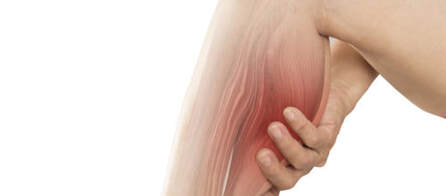 What is DOMS I’m sure anyone who has started a new exercise program, or gone to the gym and completed a new class for the first time has experienced Delayed Onset Muscle Soreness, which we shorten to DOMS. DOMS is the ache or soreness in the muscles usually felt the day after exercise, but can last for days. The origins of the soreness and accompanying symptoms are complex, but most believe soreness develops as a result of microscopic damage to muscle fibers involved in the exercise. This type of damage likely results from new stresses that were experienced during the exercise bout. There is a misconception that DOMS is related to lactic acid accumulation, but lactic acid is not a component of this process. What activities are examples, or activities that are known to cause DOMS Basically all activities which cause DOMS all cause muscles to lengthen while force is applied. This is the eccentric muscle action. Examples include the lowering phase of a bicep curl exercise or the lengthening of the quadricep muscles while the limb brakes against your body’s momentum as it walks or jogs down a hill. Example activities are any strength training exercise, walking or jogging down hills, step aerobics, jumping and plyometric activities. Does everyone experience DOMS? Everyone is susceptible to DOMS, even those people who regularly exercise and have been doing it for years. However, the severity of soreness generally will lessen as your body becomes accustomed to the work it performs regularly. And, just one bout of soreness producing exercise can have a partially protective effect that reduces the chance of that same activity causing soreness for weeks and even months into the future. Does DOMS only cause soreness? Muscle pain is only one of the characteristics of DOMS. Some other common symptoms can include:
Can we prevent DOMS? It is unlikely that the soreness can be avoided altogether, however the best way to reduce the severity is to progress slowly into a new program thereby allowing the muscle time to adapt to the new stress. It is also important to allow our muscles to recover between exercise bouts and not undertake the same exercise on subsequent days. Ie, don’t undertake the leg press 2 days in a row. There is a suggestion that a good warm up and stretching helps to reduce DOMS, although there is little evidence to support this, but it is certainly important as part of any exercise program. What can we do to ease the symptoms There is little evidence that any treatment strategies actually make DOMS recovery any quicker or return to normal function faster, but there may be things you can do to reduce the symptoms. These include light activities such as walking, ice packs, massage, tender point acupressure or oral pain medications. So what about the no pain no gain theory? It is unlikely that you will avoid soreness altogether when commencing a new program, however pain is a feedback mechanism of our body and we may need to reduce, modify or refrain from an activity whilst in pain. Pain that occurs during exercise can be an indicator that the exercise is too intense, poor form or other issues, and if this occurs it is wise to modify the activity to prevent muscle or joint damage. Lisa Parkinson Accredited Exercise Physiologist
3 Comments
13/11/2020 04:00:09 am
This was a great information about <a href="https://bcaadrinks.com/how-long-does-doms-last-delayed-onset-of-muscle-soreness/">DOMS</a>. Thankyou very much for sharing these useful insights and knowledge.
Reply
26/11/2020 11:49:55 pm
Great deals of important information and also a great article. I am currently following your blog site and I am bookmarking it for future reference. Many thanks for sharing!
Reply
Your comment will be posted after it is approved.
Leave a Reply. |
AuthorSLisa Parkinson Archives
July 2024
Categories
All
|

 RSS Feed
RSS Feed